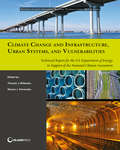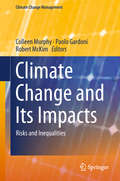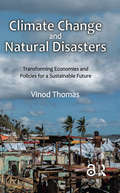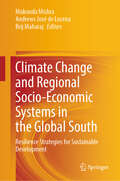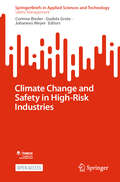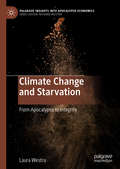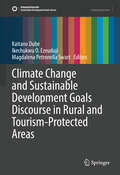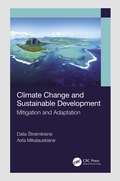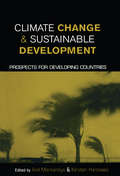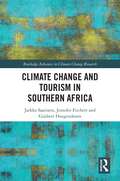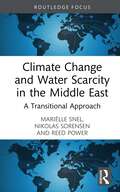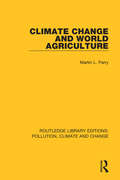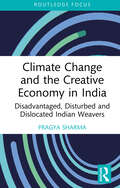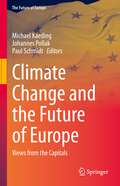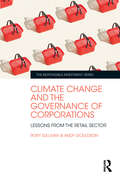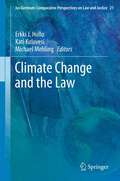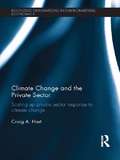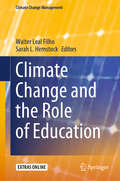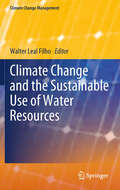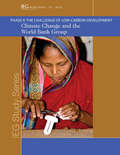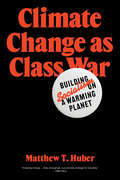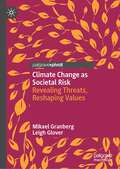- Table View
- List View
Climate Change and Infrastructure, Urban Systems, and Vulnerabilities: Technical Report for the U.S. Department of Energy in Support of the National Climate Assessment (NCA Regional Input Reports)
by Thomas J. Wilbanks Steven FernandezHurricane Irene ruptured a Baltimore sewer main, resulting in 100 million gallons of raw sewage flooding the local watershed. Levee failures during Hurricane Katrina resulted in massive flooding which did not recede for months. With temperatures becoming more extreme, and storms increasing in magnitude, American infrastructure and risk-management policies require close examination in order to decrease the damage wrought by natural disasters. Climate Change and Infrastructure, Urban Systems, and Vulnerabilities addresses these needs by examining how climate change affects urban buildings and communities, and determining which regions are the most vulnerable to environmental disaster. It looks at key elements of urban systems, including transportation, communication, drainage, and energy, in order to better understand the damages caused by climate change and extreme weather. How can urban systems become more resilient? How can citizens protect their cities from damage, and more easily rebound from destructive storms? This report not only breaks new ground as a component of climate change vulnerability and impact assessments but also highlights critical research gaps in the material. Implications of climate change are examined by assessing historical experience as well as simulating future conditions. Developed to inform the 3rd National Climate Assessment, and a landmark study in terms of its breadth and depth of coverage and conducted under the auspices of the U. S. Department of Energy, Climate Change and Infrastructure, Urban Systems, and Vulnerabilities examines the known effects and relationships of climate change variables on American infrastructure and risk-management policies. Its rich science and case studies will enable policymakers, urban planners, and stakeholders to develop a long-term, self-sustained assessment capacity and more effective risk-management strategies.
Climate Change and Its Impacts: Risks and Inequalities (Climate Change Management)
by Colleen Murphy Paolo Gardoni Robert McKimResponding to a need for a deeper and more nuanced understanding of the consequences of climate change, this book brings experts in climate science, engineering, urban planning, and conservation biology into conversation with scholars in law, geography, anthropology and ethics. It provides insights into how climate change is conceptualized in different fields. The book also aims to contribute to developing successful and multifaceted strategies that promote global, intergenerational and environmental justice. Among the topics addressed are the effects of climate change on the likelihood and magnitude of natural hazards, an assessment of civil infrastructure vulnerabilities, resilience assessment for coastal communities, an ethical framework to evaluate behavior that contributes to climate change, as well as policies and cultural shifts that might help humanity to respond adequately to climate change.
Climate Change and Natural Disasters: Transforming Economies and Policies for a Sustainable Future
by Vinod ThomasThe Open Access version of this book, available at https://www.taylorfrancis.com/books/9781351527927, has been made available under a Creative Commons Attribution-Non Commercial-No Derivatives 4.0 license The start of the new millennium will be remembered for deadly climate-related disasters - the great floods in Thailand in 2011, Super Storm Sandy in the United States in 2012, and Typhoon Haiyan in the Philippines in 2013, to name a few. In 2014, 17.5 million people were displaced by climate-related disasters, ten times more than the 1.7 million displaced by geophysical hazards. What is causing the increase in natural disasters and what effect does it have on the economy? Climate Change and Natural Disasters sends three messages: human-made factors exert a growing influence on climate-related disasters; because of the link to anthropogenic factors, there is a pressing need for climate mitigation; and prevention, including climate adaptation, ought not to be viewed as a cost to economic growth but as an investment. Ultimately, attention to climate-related disasters, arguably the most tangible manifestation of global warming, may help mobilize broader climate action. It can also be instrumental in transitioning to a path of low-carbon, green growth, improving disaster resilience, improving natural resource use, and caring for the urban environment. Vinod Thomas proposes that economic growth will become sustainable only if governments, political actors, and local communities combine natural disaster prevention and controlling climate change into national growth strategies. When considering all types of capital, particularly human capital, climate action can drive economic growth, rather than hinder it.
Climate Change and Regional Socio-Economic Systems in the Global South: Resilience Strategies for Sustainable Development
by Mukunda Mishra Andrews José de Lucena Brij MaharajThis volume showcases how the climate change phenomena (CCP) have been causing multifaceted threats to humankind through increasing numbers of extreme events, affecting social, economic, and human development worldwide. The Global South is especially showcased in this contributory volume where adverse effects of CCP and related disasters impact majority of the population which depends on land and natural resources for their livelihoods. This book asserts that climate change and extreme events are potential threats to sustainable human development and micro spatial observations and analysis of impacts of CCP are vital for adopting resilience policies. This book, not enquiring why CCP is happening, embarks on a quest to showcase how best to respond to such phenomena through detailed and well-founded micro-spatial investigations on poor farmers, pastoralists, fishermen folk, migrant labours, slum dwellers, who are considered the most threatened by climate changes and weather shocks, based on possible disruptions in the production process. Scholarly contributions in this volume analyze how local and regional versions of CCP actively challenge the economies and livelihoods, question the social securities and good governance, and how such phenomena ultimately become a constraint in achieving sustainable development in the Global South. This volume accommodates many aspects of regional adaptation strategies in vulnerable areas and groups in different parts of the Global South to ensure stability and peacefulness. Academicians, research scholars, and readers inquisitive about the socio-economic dimensions of climate change in the Global South, will find the discussions across different chapters of this volume interesting.
Climate Change and Safety in High-Risk Industries (SpringerBriefs in Applied Sciences and Technology)
by Corinne Bieder Gudela Grote Johannes WeyerThis open access book directs attention to the safety implications of disruptive, sustainability-driven changes in sociotechnical systems resulting from climate-change considerations in high-risk industries. It addresses not only the dismantling of currently prevalent systems and structures and the achievement of a stable future state but also the management of processes for establishing new practices in a safe and reliable manner without undue interruption of important functions and services.Leading scholars from various fields of research have contributed to this brief by analyzing case studies as well as through conceptual and methodological work. They propose strategies for coping with new kinds of risk at local and organizational levels. The oil and gas and nuclear industries are two cases investigated here. They present a challenging mixture of continuity and disruption and require strategies for coping with safety and sustainability issues at the same time. Innovativemethods such as real-world experimentation and computer-based simulation are discussed as means of investigating the issues at stake. Climate Change and Safety in High-Risk Industries brings together critical appraisals of the challenges that will be faced by industry, regulatory bodies and decision-makers in coming decades. It analyzes whether safety and sustainability are accurately thought of as competing imperatives or, rather, offer possibilities for a more cooperative approach to the necessary adaptations in our modes of production and consumption.
Climate Change and Starvation: From Apocalypse to Integrity (Palgrave Insights into Apocalypse Economics)
by Laura WestraThere is a lot written on climate change from various points of view, but this is the first work that demonstrates the connection between the hunger of the poor, the deprivation of safe and healthy food on the part of those who can afford it in the wealthy countries, but still face starvation in the sense of lack of nourishment, and climate change itself. It looks at the case law and the jurisdiction of the ICC, and adopts a thorough critical approach. This book is an excellent contribution to the development of the debate on climate change.
Climate Change and Sustainable Development Goals Discourse in Rural and Tourism-Protected Areas (Sustainable Development Goals Series)
by Kaitano Dube Magdalena Petronella Swart Ikechukwu O. EzeudujiDespite its potential to unlock socio-economic benefits in rural and protected areas in a manner that addresses the Sustainable Development Goals (SDG), rural and protected areas tourism is yet to be thoroughly examined by academics, scholars, practitioners, and policymakers. This lack of exploration has undermined the potential benefits associated with tourism development in rural and protected areas. Given the complexity of rural tourism, this contributed volume explores current and future debates on the subject using cases in Southern Africa. The book is useful for various audiences, including tourism academics, planners, cultural and heritage practitioners, and rural development planners. The topics covered include gender, transformation, service delivery, visitor experience, wildlife tourism, and host-community tourism interaction.
Climate Change and Sustainable Development: Mitigation and Adaptation
by Asta Mikalauskiene Dalia ŠtreimikienėClimate Change and Sustainable Development: Mitigation and Adaptation focuses on the link between climate change threats and sustainable development goals. This book analyzes the polices of climate change mitigation and adaptation from an economic point of view by addressing globalization, international trade, and business opportunities and challenges. Based on extended research on energy, transportation, agriculture, and more, the case studies included in this book present business opportunities linked to mitigation and adaptation actions; from European Union greenhouse gas emission trading to climate change adaptation policies in developing countries. It presents a framework for the harmonization of climate and sustainable development policies and their mutual outcomes. Specific features: The first book to address main scientific aspects of climate change mitigation and sustainable development and how to deal with these main challenges in a harmonized way Provides practical examples of policies and business development opportunities linked with climate change mitigation and adaptation Analyses climate change challenges and provides implications for business development and good practice case studies from Europe Discusses issues of climate change at different scales ranging from macro to micro level Highlights the importance of climate change adaptation for developing countries, migration trends, city developments and agriculture As the threat of climate change grows ever more present, resources like this book, that provide and discuss necessary solutions and frameworks for ways to deal with and mitigate that threat become ever more essential. This book is a vital resource for academics, students, and professionals in any field seeking to deal with the threats from climate change, and particularly those relating to environmental and climate sciences, as well as those in political and economic fields.
Climate Change and Sustainable Development: Prospects for Developing Countries
by Anil Markandya Kirsten Halsnaes'Makes a substantial contribution to the practical, effective analysis of climate change mitigation options in developing countries.'Development And Cooperation'The book is an excellent exercise and a good source of detailed information, and a basis for further discussions. Any person interested in this major environmental problem should read it.'International Journal of Environment and Pollution'Markandya and Halsnaes' collection is thoughtfully put together and can be recommended to all the practitioners in the fields of climate change and sustainable development.'The Journal of Energy LiteratureThis text argues that the policies pursued by developing countries will be crucial in determining the progress of climate change. Many are industrializing rapidly and the largest, particularly China and India, could have an impact at least as significant as that of the already industrialized economies - the reason given by President Bush for taking the US out of the Kyoto Protocol. The future of sustainable development in large measure depends on developing countries. This book develops a pragmatic framework for evaluating the climate change options faced by each developing country, depending on their individual circumstances. It assesses present methods, suggests how these might be improved, and proposes ways in which social and developmental aspects can be taken into account. Its discussion of the issues and the methods presented contribute to the practical analysis of climate change mitigation options in developing countries. The book should be useful to professionals, governments, international organizations and environmental groups working on climate change issues; as well as researchers, academics and students in economics, environmental and development studies and international affairs.
Climate Change and Tourism in Southern Africa (Routledge Advances in Climate Change Research)
by Jarkko Saarinen Jennifer Fitchett Gijsbert HoogendoornThis book explores the nature of climate change in southern Africa, its impacts on tourism and the resilience, adaptation and governance needs in various tourism operations and environments. Previous studies on climate change and tourism have mainly focused on the Global North and specific forms of tourism such as snow-based winter activities. Drawing on case studies from a wide range of countries including South Africa, Lesotho, Namibia, Botswana and Zimbabwe, this book fills this lacuna by describing and analysing the climate change and tourism nexus in the southern African context. The book begins by providing an overview of the current and estimated impacts of climate change to the tourism industry in the region, highlighting the deepening socio-economic inequities, and environmental and social injustices. It focuses on the importance of sustainable tourism in tackling these issues and highlights that resilience and robust governance and policy systems are essential for a tourism destination to successfully adapt to change. By synthesising the key lessons learned through this analysis, Climate Change and Tourism in Southern Africa also draws attention to specific adaptation and policy strategies which have value for other regions in the Global South. This book will be of great interest to students and scholars of climate change, tourism and environmental policy and justice.
Climate Change and Water Scarcity in the Middle East: A Transitional Approach (Earthscan Studies in Water Resource Management)
by Mariëlle Snel Nikolas Sorensen Reed PowerAs water's significance as a geopolitical resource is poised to surpass that of oil, this book explores the adaptation of Water, Sanitation, and Hygiene (WASH) services in the Middle East to climate change challenges, leveraging the Humanitarian-Development-Peace nexus for a sustainable transition and resilient solutions. Delving into the humanitarian and development sectors across the region, the authors advocate for a transformative approach towards more innovative, integrated, and localized programming. It draws a parallel between the increasing global shift in humanitarian needs, as starkly revealed by the COVID-19 pandemic, and the ongoing devastation wrought by climate change, particularly through water-related crises such as flooding, drought, famine, and conflict. The authors stress the urgent need for adaptive and sustainable strategies that can swiftly respond to evolving climate challenges. This book argues that there is currently a window of opportunity for WASH practitioners to develop broader, multi-sectoral experiences to meet these challenges. Drawing on discussions with humanitarian and development practitioners and new contemporary case studies, this book analyzes the financial, institutional, environmental, technical, and socio-cultural considerations for creating sustainable WASH services in transition. The narrative emphasizes the urgent need for a Humanitarian-Development-Peace nexus approach, advocating for multisectoral collaboration and localization as vital to addressing protracted crises and climate change's escalating threats. It calls for a strategic shift towards organizations that merge immediate humanitarian aid with sustainable development, enhancing local capacities for effective, enduring solutions. The authors conclude by outlining practical actions for humanitarian and development organizations at the local, national, regional, and global levels to support effective integrated and transitional WASH programming in the future.
Climate Change and World Agriculture
by Martin L. ParryOriginally published in 1990, this book analysed the sensitivity of the world food system and looked at the variety of ways in which it would be affected by climate change. It describes the effects of climate change on agriculture, estimates the impacts on plant and animal growth and looks at the geographical limits to different types of farming. It also considers the range of possible ways to adapt agriculture and so to mitigate the disastrous consequences of climate change.
Climate Change and the Creative Economy in India: Disadvantaged, Disturbed and Dislocated Indian Weavers (Routledge Focus on the Global Creative Economy)
by Pragya SharmaWeaving has been a significant aspect of India’s cultural and economic history. Climate change is increasingly affecting crucial relationships within the weaver communities. This book explores the dialectical relationship between the craft of weaving and the changing climate.Exploring questions of how climate variabilities are affecting local geographies and weaving ecosystems, the book discusses case studies of creative economy clusters in India. The author employs ethnographic fieldwork to share lived and embodied experiences of climate change.This concise book will be useful reading to scholars, researchers and students with an interest in the creative and cultural industries and how these intersect with environmental issues and climate change.
Climate Change and the Future of Europe: Views from the Capitals (The Future of Europe)
by Michael Kaeding Paul Schmidt Johannes PollakWhile the ambitious objectives outlined in the EU’s Green Deal aim at making Europe the first climate-neutral continent by 2050, national implementation greatly varies depending on local geographies, history, culture, economics, and politics. This book analyses Member States’ and EU neighbours’ national efforts to combat climate change. It subsequently draws on these factors to highlight local challenges, tensions, and opportunities on the road towards climate neutrality. In the context of inter-country dependencies following Russia’s war against Ukraine, it addresses strategic questions regarding EU integration, the transformation of our economies, the reduction of energy dependencies, and public perception of the above. The book also makes concrete recommendations, in various policy areas, on how individual countries and the EU as a whole should deal with the climate crisis.
Climate Change and the Governance of Corporations: Lessons from the Retail Sector (The Responsible Investment Series)
by Rory Sullivan Andy GouldsonClimate change represents the most important environmental challenge of our time. Organisations are responding by implementing governance processes and taking action to reduce their own emissions and the emissions from their supply chains and value chains. Yet very little is known about how these efforts contribute to reducing greenhouse gas emissions (if, indeed, they make any substantive contribution at all) or about how they might be harnessed to deliver more ambitious reductions in emissions. This book explains when and where particular forms of governance intervention – including internal governance processes and external governance pressures – are likely to impact climate change. From this analysis, it offers practical proposals on the climate policy frameworks that need to be in place to facilitate or accelerate changes in corporate behaviour. The book is truly global: it focuses on the world’s 25 largest retailers (including Walmart, Tesco, Carrefour, Sears and Aldi) and is based on detailed interviews with senior managers from these corporations, and with key global and national NGOs, corporate responsibility experts, politicians and regulators. These interviews provide clear insights into how external governance pressures and actions (public opinion, regulation, incentives) interact with internal governance conditions (management systems and processes, corporate policies, board/CEO leadership) to change and shape corporate actions on climate change and, in turn, the climate change impacts of these corporations. This book can be used as a core reference for any courses dealing with corporate governance and business strategy, in particular those relating to climate change and to environmental management more generally. It is also of relevance to business practitioners, public policy makers, investors and NGOs interested in ensuring that companies play a constructive role in the transition to a low-carbon economy.
Climate Change and the Law (Ius Gentium: Comparative Perspectives on Law and Justice #21)
by Michael Mehling Kati Kulovesi Erkki J. HolloClimate Change and the Law is the first scholarly effort to systematically address doctrinal issues related to climate law as an emergent legal discipline. It assembles some of the most recognized experts in the field to identify relevant trends and common themes from a variety of geographic and professional perspectives. In a remarkably short time span, climate change has become deeply embedded in important areas of the law. As a global challenge calling for collective action, climate change has elicited substantial rulemaking at the international plane, percolating through the broader legal system to the regional, national and local levels. More than other areas of law, the normative and practical framework dedicated to climate change has embraced new instruments and softened traditional boundaries between formal and informal, public and private, substantive and procedural; so ubiquitous is the reach of relevant rules nowadays that scholars routinely devote attention to the intersection of climate change and more established fields of legal study, such as international trade law. Climate Change and the Law explores the rich diversity of international, regional, national, sub-national and transnational legal responses to climate change. Is climate law emerging as a new legal discipline? If so, what shared objectives and concepts define it? How does climate law relate to other areas of law? Such questions lie at the heart of this new book, whose thirty chapters cover doctrinal questions as well as a range of thematic and regional case studies. As Christiana Figueres, Executive Secretary of the United Nations Framework Convention on Climate Change (UNFCCC), states in her preface, these chapters collectively provide a "review of the emergence of a new discipline, its core principles and legal techniques, and its relationship and potential interaction with other disciplines."
Climate Change and the Private Sector: Scaling Up Private Sector Response to Climate Change (Routledge Explorations in Environmental Economics #40)
by Craig A. HartClimate Change and the Private Sector explores the challenges of transforming our energy infrastructure to become carbon neutral and adapting to climate change in the twenty-first century. It examines the critical role that the private sector must play in these challenges. To transform the global energy complex to be carbon neutral within a time frame designed to prevent irreparable damage to the environment presents unprecedented challenges. The private sector must deploy financial, material, and engineering resources on a scale never before undertaken — with government providing leadership, removing barriers and supporting industry efforts through policies that mobilize markets to achieve environmental objectives. A key element of supporting private sector initiative to address climate change is policies that help form and sustain markets that supply, finance and generate demand for the technologies necessary to transform our energy infrastructure. The characteristics and examples of these policies are explored in detail. Companies that respond to these challenges both by mitigating greenhouse gases and adapting to climate change will enhance their own competitiveness and contribute to society in the process. Companies that embrace the challenge to decarbonize their manufacturing operations, whether in response to regulation (or the threat of regulation) or market opportunities, invariably discover ways to improve their operations in the process that could potentially enhance their ability to produce better products, more efficiently. The book explores examples of companies that have redesigned their products and manufacturing processes, and in doing so transformed themselves and reshaped their industries. As in the case of companies mitigating greenhouse gas emissions, companies that lead their industries in adapting their own operations to a changing physical environment are more likely to ensure their resilience in a changing business environment. This book provides business, policy and academic audiences with an in-depth exploration of the subject, and a practical guide to action.
Climate Change and the Role of Education (Climate Change Management)
by Walter Leal Filho Sarah L. HemstockThis book offers insights into the educational dimensions of climate change and promotes measures to improve education in this context. It is widely believed that education can play a key role in finding global solutions to many problems related to climate change. Indeed, education as a process not only helps young people to better understand and address the impact of global warming, but also fosters better attitudes and behaviours to aid efforts towards mitigating climate change and adapting to a changing environment. But despite the central importance of education in relation to climate change, there is a paucity of publications on this theme. Against this background, the book focuses on the educational aspects of climate change and showcases examples of research, projects and other initiatives aimed at educating various audiences. It also provides a platform for reflections on the role education can play in fostering awareness on a changing climate. Presenting a wide range of valuable lessons learned, which can be adapted and replicated elsewhere, the book appeals to educators and practitioners alike.
Climate Change and the Sustainable Use of Water Resources (Climate Change Management)
by Walter Leal FilhoThe book explores the geo-chemical, physical, social and economic impacts of climate change on water supplies. It contains examples and case studies from a wide range of countries, and addresses the need to promote sustainable water use across the world.
Climate Change and the World Bank Group
by The World BankThis study from the Independent Evaluation Group draws lessons for development and climate change mitigation from the World Bank Group's far-reaching portfolio of projects in energy, forestry, transport, coal power, and technology transfer. Reviewing what has worked, what hasn't, and why, the evaluation's key findings include: Energy efficiency can offer countries direct economic returns that dwarf those of most other development projects, while also reducing greenhouse gas emissions. Tropical forest protected areas, on average, significantly reduce tropical deforestation, preserving carbon and biodiversity. Deforestation rates are lower in areas that allowed sustainable use by local populations than in strictly protected areas. Deforestation rates were lowest of all in indigenous forest areas. For renewable energy projects, long-duration loans have been important in making projects financially viable.. But at prevailing carbon prices, carbon offset sales had little impact on most renewable energy projects' rate of returns, and did not address investors' need for up-front capital. Technology transfer - broadly understood to include diffusion of technical and financial innovations related to low-carbon development - has worked well when the logic of piloting and demonstration is well thought out, and when grants are used to mitigate the risk of pioneering efforts.
Climate Change as Class War: Building Socialism on a Warming Planet
by Matthew T. HuberHow to build a movement to confront climate changeThe climate crisis is not primarily a problem of &‘believing science&’ or individual &‘carbon footprints&’ – it is a class problem rooted in who owns, controls and profits from material production. As such, it will take a class struggle to solve. In this ground breaking class analysis, Matthew T. Huber argues that the carbon-intensive capitalist class must be confronted for producing climate change. Yet, the narrow and unpopular roots of climate politics in the professional class is not capable of building a movement up to this challenge. For an alternative strategy, he proposes climate politics that appeals to the vast majority of society: the working class. Huber evaluates the Green New Deal as a first attempt to channel working class material and ecological interests and advocates building union power in the very energy system we need to dramatically transform. In the end, as in classical socialist movements of the early 20th Century, winning the climate struggle will need to be internationalist based on a form of planetary working class solidarity.
Climate Change as Societal Risk: Revealing Threats, Reshaping Values
by Mikael Granberg Leigh GloverThis book analyzes climate change from a societal risk perspective, considering IPCC data, harm reduction, and global impact. Climate change is a globalised agent of social disruption whose impacts will worsen societal inequities and inequalities around the world. For some unfortunate societies already precariously exposed, climate change will tip them into societal collapse. Devastation will also occur to many ecological values in which all societies are embedded. But effective social action can limit the extent of these costs and losses. Ultimately, only social transformation can limit the social and environmental harms of climate change. But what does this mean? To what extent is society at risk? Are such risks particularized and restricted to specific segments and localities? Or is society at risk in a more universal way? Climate risks are re-shaping the practices of households, communities, governments and businesses. In this way, climate risks are a dynamic element in social change and social processes. Risk holds a mirror to society, revealing who and what is prioritized, recognized and valued. It also provides a reckoning of our perceived strengths, vulnerabilities and weaknesses. This volume examines how we understand the societal risks of contemporary and forecast climate change impacts—and those risks inherent in dealing with these impacts. We know that society is fashioning a new global climate—but climate change is also re-fashioning society; this book explores this dynamic process and considers its implications for future society.
Climate Change in 2017: Implications for Business
by Rebecca Henderson Amram Migdal Sophus A Reinert Polina DekhtyarProfessors Rebecca M. Henderson and Sophus A. Reinert, Polina Dekhtyar (MBA 2016), and Case Researcher Amram Migdal (Case Research & Writing Group) prepared this note as the basis for class discussion.
Climate Change in 2018: Implications for Business
by Rebecca Henderson Amram Migdal Sophus A Reinert Polina DekhtyarThis note provides general information about climate change and its implications for business. Included is an overview of climate change science and a number of its impacts, including rising sea levels, changing weather patterns and extreme weather, pressure on water and food, political and security risks, human health risks, and impact on wildlife and ecosystems. Next, responses to climate change are outlined, including improvements in energy efficiency, moving away from fossil fuels, changes in land use and agriculture practices, and geoengineering. The note concludes with the debate over who should pay and how much should be spent to mitigate and adapt to climate change and the implications for the private sector.
Climate Change in 2020: Implications for Business
by Sophus A. Reinert Rebecca M. Henderson Mariana OsegueraThis note provides general information about climate change and its implications for business. Included is an overview of climate change science and a number of its impacts, including rising sea levels, changing weather patterns and extreme weather, pressure on water and food, political and security risks, human health risks, and impact on wildlife and ecosystems. Next, responses to climate change are outlined, including improvements in energy efficiency, moving away from fossil fuels, changes in land use and agriculture practices, and geoengineering. The note concludes with the debate over how much should be spent to mitigate and adapt to climate change, who should pay, and the implications for the private sector.
